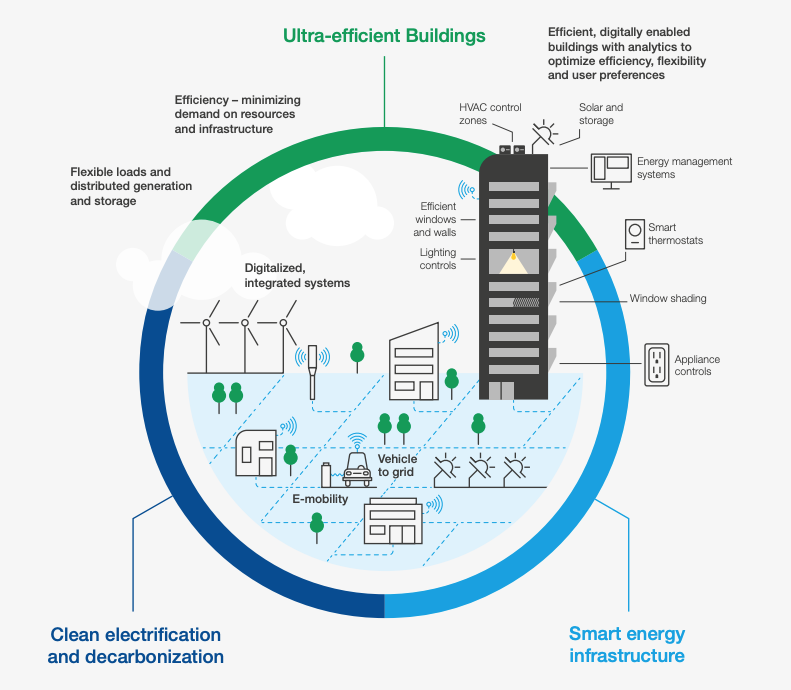‘My Carbon’: An approach for inclusive and sustainable cities

Sustainable cities enabled through smart communities.
Image: Denys Nevozhai on Unsplash
Stay up to date:
Climate Crisis
Listen to the article
- While transport and buildings are the major drivers for emissions in cities, the share of individual emissions is significant.
- Personal carbon allowance programs have had limited success due to a lack of awareness and fair mechanism for tracking emissions.
- Yet there have been major developments in recent years that could help realise "My Carbon" initiatives.
Cities across the world account for almost 75% of our total carbon emissions. As countries move towards implementing their pledges for a net zero future, urban areas will remain the action ground for decades to come. While transport and buildings are the major drivers for emissions in cities, the share of individual emissions are significant at around 40%.
Inclusivity of citizens is becoming the most important element of success or failure in the journey towards sustainability. Community-led initiatives can make a significant contribution towards sustainability, increase resilience and social cohesion. There have been numerous examples of personal carbon allowance programs in discussions for the last two decades, however they had limited success due to a lack of social acceptance, political resistance, and a lack of awareness and fair mechanism for tracking “My Carbon” emissions.
Our world is transforming – big community trends for sustainable cities
There have been significant developments in last five to seven years on social, environment and technology fronts that could help realise “My Carbon” initiatives for shaping the future towards smart and sustainable cities.
Specifically, to mention three developments in this context:
1. COVID-19 was the test of social responsibility – A huge number of unimaginable restrictions for public health were adopted by billions of citizens across the world. There were numerous examples globally of maintaining social distancing, wearing masks, mass vaccinations and acceptance of contact-tracing applications for public health, which demonstrated the core of individual social responsibility.

2. Fourth Industrial Revolution technology breakthroughs – Advances in emerging technologies like AI, blockchain and digitization can enable tracking personal carbon emissions, raise awareness and also provide individual advisories on lower carbon and ethical choices for consumption of product and services. The World Economic Forum’s Scale 360 initiative demonstrates the use of fourth industrial revolution technologies across the whole life cycle of products and services.
There have been major advances in smart home technologies, transport choices with carbon implications, the roll-out of smart meters in providing individual choices to reduce their energy-related emissions, the development of new personalized apps to account for personal emissions, and better personal choices for food and consumption-related emissions. AI can also help strengthen circular economy business models like product as a service models, demand predictions, and smart asset management by combining real time and historical data from products and users.
There is a significant number of programs and applications enabling citizens to contribute towards carbon emissions by providing them in-depth awareness on the choices of personal carbon for food, transport, home energy and lifestyle choices.

These energy efficiency apps give suggestions and statistics regarding greenhouse emissions and offer ways to reduce your personal footprint. Keeping track of energy consumption in the home and motivating people to make lifestyle changes and to contribute your share towards the betterment of the environment.
3. Raised awareness and ownership for nature and environment – In the last few years, there is an increased awareness and public concern on climate change and specially among youth. The UNDP’s “Peoples’ Climate Vote” reflects that over 64% of people believe climate change is a global emergency. A new Pew Research Center survey in 17 advanced economies found widespread concern about the personal impact of global climate change: 80% of citizens say they are willing to change how they live and work to combat the effects of climate change. Young adults, who have been at the forefront of some of the most prominent climate change protests in recent years, are more concerned than their older counterparts about the personal impact of a warming planet in many public surveys.

What next? Sustainable cities enabled through smart communities
The three trends provide strong evidence towards enabling a social movement for “My Carbon” initiatives by enabling public-private partnerships to help curate this program. It is suggested to drive a three-way approach to shape this movement.

Such economic action will need policy enablement from city leadership through extensive discussion between stakeholders to arrive at a fair and inclusive approach.
The levers of Cognitive Enablement and Social Norms will be much more impactful through citizen engagement programs and learnings from the above-mentioned trends need to be captured to design these programs. Innovative AI and machine-learning capabilities would help capture embedded emissions in goods and services, and could help in providing individuals with tailored and timely advice on how to reduce their lifestyle emissions.
What is the Forum doing to help cities to reach a net-zero carbon future?
Finally, it is significant that all stakeholders across the value chain come together and contribute towards achieving a net-zero future by leaving no one behind.
Accept our marketing cookies to access this content.
These cookies are currently disabled in your browser.
Don't miss any update on this topic
Create a free account and access your personalized content collection with our latest publications and analyses.
License and Republishing
World Economic Forum articles may be republished in accordance with the Creative Commons Attribution-NonCommercial-NoDerivatives 4.0 International Public License, and in accordance with our Terms of Use.
The views expressed in this article are those of the author alone and not the World Economic Forum.
Forum Stories newsletter
Bringing you weekly curated insights and analysis on the global issues that matter.
More on Climate ActionSee all
Muhammad Hassan Dajana and James Balzer
June 27, 2025
Park Jae-Pil
June 26, 2025
David Elliott
June 25, 2025
Chiara Cecchini
June 25, 2025
Deliang Chen and Gill Einhorn
June 24, 2025
Wen Shugang
June 24, 2025






